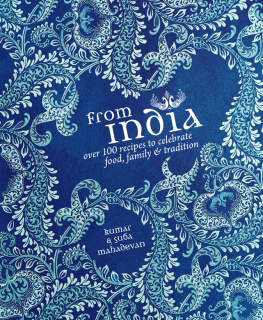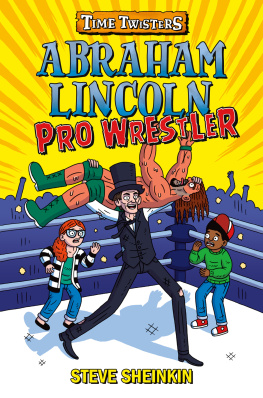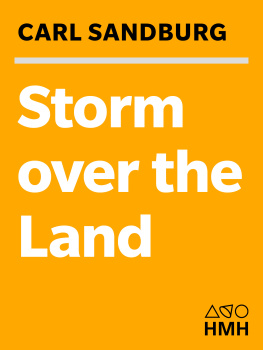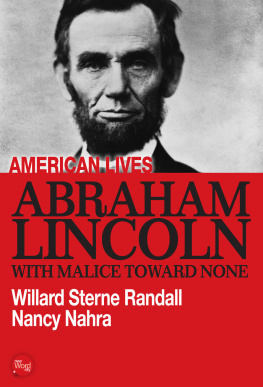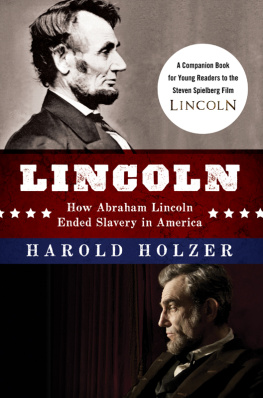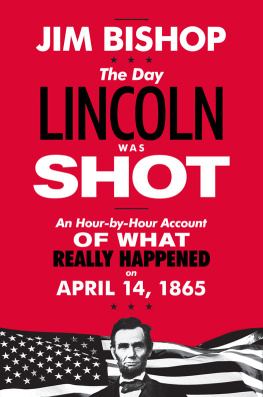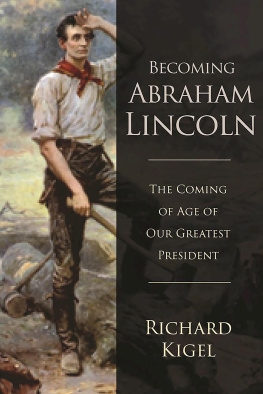LAND OF LINCOLN
Also by Andrew Ferguson
Fools Names, Fools Faces
LAND OF LINCOLN
Adventures in Abes America
ANDREW FERGUSON

Copyright 2007 by Andrew Ferguson
All rights reserved. No part of this book may be reproduced in any form or by
any electronic or mechanical means, or the facilitation thereof, including
information storage and retrieval systems, without permission in writing from
the publisher, except by a reviewer, who may quote brief passages in a review.
Any members of educational institutions wishing to photocopy part or all of the
work for classroom use, or publishers who would like to obtain permission to
include the work in an anthology, should send their inquiries to
Grove/Atlantic, Inc., 841 Broadway, New York, NY 10003.
Photo credits on p. 281
Published simultaneously in Canada
Printed in the United States of America
Library of Congress Cataloging-in-Publication Data
Ferguson, Andrew, 1956
Land of Lincoln / Andrew Ferguson.
p. cm
eBook ISBN 13: 978-1-5558-4851-4
1. Lincoln, Abraham, 18091865Influence. 2. Lincoln, Abraham, 1809
1865Public opinion. 3. Lincoln, Abraham, 18091865Miscellanea.
4. Ferguson, Andrew, 1956TravelUnited States. 5. United States
Description and travel. 6. PresidentsUnited StatesBiography
Miscellanea. 7. Public opinionUnited States. I. Title.
E457.2.F47 2007
973.7092dc22 2006052634
Atlantic Monthly Press
an imprint of Grove/Atlantic, Inc.
841 Broadway
New York, NY 10003
Distributed by Publishers Group West
www.groveatlantic.com
To Denise
CONTENTS
Chapter 1
When Lincoln Came Back to Richmond
Chapter 2
Billy Herndon and the Inner Mr. L.
Chapter 3
The Past Isnt What It Used to Be
Chapter 4
The Kingmakers Wife, the Emotional Engineer, and the Triumph of Fun
Chapter 5
The Magic of Stuff
Chapter 6
A Sea of Lincolns
Chapter 7
Abe Lincoln and the Secret of Success
Chapter 8
Hot on the Trail
Chapter 9
A Whole Lotta Lincoln
Chapter 10
In Defense of the Icon
PREFACE
More books have been written about Abraham Lincoln than about any other Americannearly fourteen thousand in alland at least half of those books begin by saying that more books have been written about Abraham Lincoln than about any other American. This book, youll notice, is one of them. Yet its subject matter is not Lincoln directly, or Lincoln exclusively. Its subject is really the country that Lincoln created and around which, I think I can show, he still putters, appearing here and there in likely and unlikely places, obtruding, stirring things up, offering consolation, dispensing bromides and bits of wisdom and otherwise making himself undeniable.
So even though this is a Lincoln book and not a book about mesorry to disappoint youit might help explain some things that happen in the book later on if I explain at the outset my own association with Lincoln, which runs pretty deep.
I was born in a midsize town in northeastern Illinois, the state that sells itself (to itself, among others) as the Land of Lincoln; its convicts stamp the claim right there on the license plates. My father worked as a lawyer in Chicago, in a firm founded after the Civil War by Robert Todd Lincoln, the only one of Abraham Lincolns sons to survive childhood. I grew up in a drafty old Victorian house on Lincoln Street, a mile or so from another drafty old Victorian where, legend has it, Lincoln himself had spent the night in the 1850s. Riding in our familys Oldsmobile as a boy, I saw this house nearly every day, turning in my seat as we passed, always picturing the tall stooped figure climbing the front porch, removing his stovepipe hat to greet the lady of the house as he crossed the threshold into the cool of the parlor, until the Olds took the bend in the road and the house was out of sight.
During the long humid summers, on visits to grandparents and cousins downstate, my parents would sometimes break the boredom by taking my brothers and me on side trips to the state capital of Springfield, an exhausted city of liquor stores and parking lots but to me a place full of wonders. There in the heat we would run a well-worn path from the Lincoln tomb to the Restored Law Offices of A. Lincoln to the only home A. Lincoln ever owned, a clapboard house tucked behind a picket fence in a down-at-the-heels neighborhood not far from the Capitol building. Once or twice we drove twenty miles out of town to New Salem, the village on a bluff above the Sangamon River where Lincoln spent his young manhood. Its inhabitants abandoned New Salem long before Lincoln died, and a commemorative collection of log cabins had been rebuilt on the site a century later, as a tourist draw. Already, by the time of our first visit, the splintered logs of the new buildings had grown gray and brittle from the weather, taking on the faded look of historical artifacts themselves. Our Lincoln diversions climaxed in a long car trip the family took one bright, blissful week along the then new, and soon to be defunct, Lincoln Heritage Trail.
Having been where hed been, and walked where hed walked, I became a Lincoln buff, junior division, privileged to indulge (I thought) in a special intimacy with greatness. I cleared my schedulenot so hard to do when youre tenwhenever Abe Lincoln in Illinois or Young Mr. Lincoln was to show up on TV. My favorite book was a photographic album as thick and heavy as a plank of oak, called Lincoln in Every Known Pose. My second favorite was a Yearling childrens book called Abraham Lincoln, by Ingri and Edgar DAulaire, a beautifully illustrated biography whose only defect was that it ended before his dark and splendidly heartbreaking death. Photographs of Lincoln hung on the walls of my bedroom. Sometimes at night, wakened by a bad dream, Id rise from my bed and go to my desk and pull from the center drawer a sheaf of papers written in Lincolns own hand. Id bought a packet of these yellowed, crinkly reproductions, reeking of the rust-colored dye that was meant to make them look antique, at a cavernous gift shop near his birthplace. The words carried the force of an incantationentrancing, if not, to me, thoroughly comprehensible. By the light of the desk lamp Id read the Letter to Mrs. Bixby or the last paragraph of the Second Inaugural, the one beginning With malice toward none... I memorized the Gettysburg Address and his sublime Farewell to the people of Springfield.
What I mean is, I had a great deal of Abraham Lincoln growing up. I was a buff, and I was not alone.
And then I wasnt a buff anymore. The country had undergone a Lincoln boom in the early 1960s, following the 150th anniversary of his birth and coinciding with the centennial celebrations of the Civil War, and not long after the centennial passed my interest in Lincoln waned too. On my bedroom walls Lincoln was replaced by the Beatles, who were themselves replaced in a few years by the languid Susan Dey. Every Known Pose sat stoutly on the shelf, unconsulted, passing eventually to a box in my parents garage, doomed. I dont know what happened to it, or to the sheaf of Lincoln papers. I seldom recalled Springfield or New Salem. Something similar was happening in the country at large, I think. The great historical amnesia, certified and lamented nowadays by professional educators and tut-tutters of all kinds, was just settling in. Fewer and fewer courses in American history were taught less and less frequently, and those that survived were recast as exercises in multicultural special-pleading or litanies of political grievance. The tuttutters took surveys and compiled the sad data of what has come to be called historical illiteracy: fully two-thirds of graduating high school seniors cant name the half century in which the Civil War was fought, another third cant identify Thomas Jefferson, 65 percent think Stone-wall Jackson was a bass player for the Funkadelics, and so on. Historical tourism, another marker, declined too. The historian Barry Schwartz checked the figures and found a steady decline in attendance at Lincoln sites from the 1960s to the end of the century. More than a million people a year visited New Salem in the mid-sixties, for example; twenty years later the number was reduced by half.
Next page





